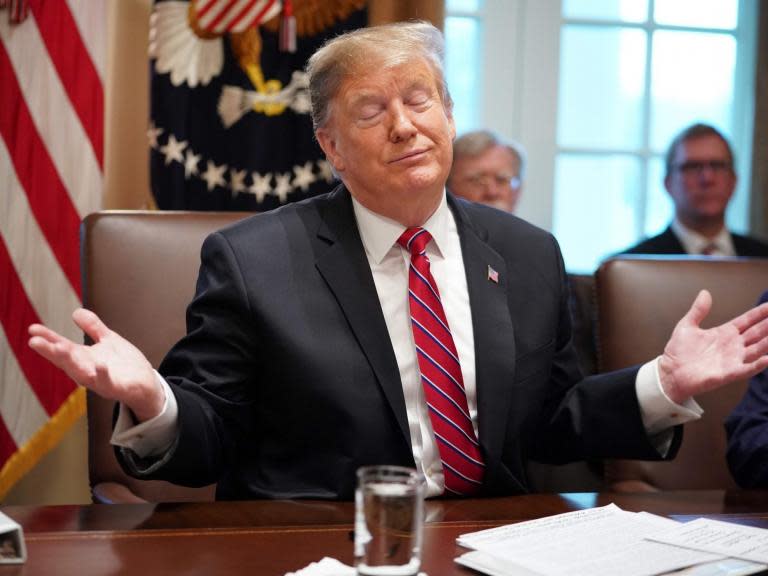Trump to veto Alexandria Ocasio-Cortez resolution blocking national emergency unless Republicans lend support
Donald Trump is prepared to issue the first veto of his presidency over a national emergency declaration his critics have slammed as an unconstitutional power grab, a senior White House official said on Sunday.
White House senior adviser Stephen Miller told Fox News Sunday that “the president is going to protect his national emergency declaration”.
Asked if that meant the president was ready to veto, Mr Miller added: “He’s going to protect his national emergency declaration, guaranteed.”
The president declared the emergency Friday in an effort to go around Congress to fund his border wall. It would allow him to move federal dollars earmarked for military construction to the border – but is already facing legal and political challenges.
The proclamation cited an increase in families coming across the border and an inability to detain families during deportation proceedings – not drugs or violence as the president outlined in his press conference. The top two Democrats in Congress said they’d use “every remedy available” to oppose what they cast as an unlawful measure.
California Attorney General Xavier Becerra said his state would sue “imminently” to block the order, after the American Civil Liberties Union and the nonprofit watchdog group Public Citizen announced Friday they were taking legal action.
Democrats are planning to introduce a resolution disapproving of the declaration once Congress returns to session that is likely to pass.
Several Republican senators are already indicating they would vote against Mr Trump – though there do not yet appear to be enough votes to override a veto by the president.
In his emergency proclamation, Mr Trump painted a dark picture of the border as “a major entry point for criminals, gang members, and illicit narcotics” and one that threatens “core national security interests”. Overall, though, illegal border crossings are down from a high of 1.6m in 2000.
His declaration instantly transformed a contentious policy fight into a foundational dispute over the separation of powers enshrined in the constitution, spurring talk of a congressional vote to block Mr Trump and ensuring that the president and Democrats will continue fighting over the border wall in Congress, the courts and on the campaign trail.
It triggered outrage from Democrats, unease among some Republicans and flew in the face of years of GOP complaints that Barack Obama had over-reached in his use of executive authority.
“By the president’s very own admission in the Rose Garden, there is no national emergency. He just grew impatient and frustrated with Congress, and decided to move along his promise for a border wall ‘faster,’” said American Civil Liberties Union executive director Anthony Romero.
Republicans had opposed the president declaring a national emergency, repeatedly warning that it would set a bad precedent and divide the party when Democrats put it up for a vote. While many in the GOP on Friday fell in line behind Mr Trump’s decision, others remain opposed.
“I don’t believe a national emergency declaration is the solution,” Thom Tillis, a North Carolina Republican, said in a statement.
“It wouldn’t provide enough funding to adequately secure our borders, it would likely get tied up in litigation, and most concerning is that it would create a new precedent that a left-wing president would undoubtedly utilize to implement their radical policy agenda while bypassing the authority of Congress.”
Additional reporting by AP

 Yahoo News
Yahoo News 

